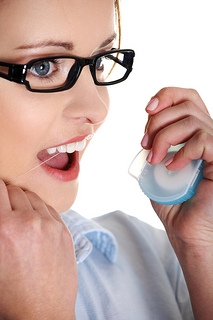Overall Health Can Be Influenced By Oral Hygiene
March 20th, 2018

Keeping on top of your oral health is key when it comes to making sure your whole body stays healthy. The bacteria that occur naturally in your mouth can produce harmful bacteria such as strep and staph, which can lead to serious infections and sickness.
When you follow good dental habits like daily brushing and flossing, and eat a healthy diet, you can discourage harmful bacteria from traveling from your mouth to other parts of your body. Protect yourself and learn more about the link between oral hygiene and a healthy body.
Until recently, tooth decay was more common because of the lack of regular dental care and research behind fluoride. Tooth decay is much less problematic today, due to fluoridated water and toothpastes that contain fluoride.
Nowadays, gum disease has replaced tooth decay as the most frequent dental problem. Periodontal disease is on the rise among adults because people don’t floss regularly and then ignore gum tenderness and bleeding. If left unchecked, periodontitis can cause inflammation that may cause harm to other parts of the body.
Oral Health and Chronic Disease
Many scientists believe inflammation-related infections can trigger systemic disease or intensify existing conditions. Remember, bacteria overgrowth in inflamed gum tissue is able to enter the bloodstream through your eating processes, which is why it’s so vital to visit our Romeoville, IL office if you notice sustained gum irritation and inflammation in your mouth.
Caring for your teeth and gums every day can prevent the onset of disease and save you trouble in the future with regard to your body’s health. If you think you may be showing signs of periodontal disease, or notice anything else out of the norm, please contact Drs. Angela Paros, Amer Atassi, Eric Young, Alexander Katsnelson and schedule an appointment.
We want you to be proactive about your health!
Pregnancy and Oral Care
March 13th, 2018

Pregnancy involves a lot of alterations in your health. High Point Dental Group is here to help you understand the oral health aspects of your pregnancy.
As you may already know, your body becomes more susceptible to bacterial complications. In terms of oral health, you may be at a higher risk for gingivitis and periodontal disease during the course of your pregnancy.
The hormonal changes in your body can create a more welcoming environment for gum infections, including gingivitis. Although you may continue to brush and floss on a regular basis, and maintain your schedule of cleaning appointments, you are still prone to an increased risk of gingivitis. Your gums may feel more sensitive and become more prone to bleeding because of the increased amount of blood flowing through your body. This can also be a side effect of periodontal disease, which nearly 40% of pregnant women have.
In order to avoid painful dental visits, you should attempt to brush more than twice a day and always floss regularly. We recommend investing in a good mouthwash for extra protection against plaque buildup. Other oral conditions to watch out for during pregnancy include oral gingival lesions, tooth mobility, tooth erosion, and dental caries.
Keeping your oral health in top shape will prevent bacteria from circulating to other places in your body during pregnancy. Your immune system is more likely to be compromised, which means you generally face an increased risk for illnesses.
Don’t forget that you share nutrients and pathogens with your baby, so it’s crucial to reduce your risks in every possible way. If you think you may be experiencing an oral health issue during your pregnancy, please call our Romeoville, IL office to schedule an appointment, and we will be happy to help you.
I’ve lost a filling; now what?
March 6th, 2018

Dental fillings usually protect our teeth, but sometimes they need to be protected, too. If you lose a filling, contact our Romeoville, IL office immediately and let us advise you on the next steps to take.
Fillings serve an important function in oral health by preserving the structural integrity of your tooth. With the materials we use today, dental fillings usually last for many years, but they are subjected to the same stresses as your natural teeth are.
You can wear down, chip, crack, or break your fillings by eating, clenching, and grinding, and sometimes they can fall out completely. While you may not notice normal wear and tear, you should not ignore any fillings that loosen or fall out. Contact us as soon as possible so we can advise you about whether you need to be seen immediately.
If your fillings get damaged or fall out, a timely response can be important. There may be gaps or holes in your tooth which provide an easy access point for bacteria. Once bacteria begin working into your tooth structure, your tooth could become damaged even worse. Since cavities usually form in hard-to-reach places, it will be difficult for you to remove these bacteria through brushing alone.
When is a lost filling an emergency?
A lost or cracked filling is usually not an emergency unless you are in great pain or are bleeding excessively. In that case, contact our office immediately so we can schedule an emergency appointment. Otherwise we will schedule a regular appointment to evaluate and repair your filling. Before coming in for your appointment, try to avoid chewing on that side of your mouth, rinse with warm salt water, and be sure to brush and floss thoroughly after every meal.
Once you come to our office, Drs. Angela Paros, Amer Atassi, Eric Young, Alexander Katsnelson will examine your tooth, assess the situation, and advise you of your options. We may be able to replace the filling and can discuss whether an amalgam or composite material would be the best for your teeth. If the filling was large, a root canal or a dental implant and crown may be necessary.
A lost or cracked filling may not always pose a dental emergency, but it’s always important to contact us so our team can help you take the proper action to preserve your oral health.
Stress and Your Oral Health
February 27th, 2018

Stress symptoms—which include high blood pressure, severe aches, and insomnia—may be affecting your health, even though you might not realize it. You may think illness is the culprit when in fact stress may actually be the reason. While stress can be good for us sometimes, Drs. Angela Paros, Amer Atassi, Eric Young, Alexander Katsnelson and our team know stress can be physically harmful. But what is often overlooked is that stress can also take a toll on your mouth. Here’s how:
Teeth Grinding
It’s not uncommon for people dealing with stress to develop teeth grinding, also known as bruxism. People who grind their teeth at night may do so unconsciously, but the condition requires treatment to prevent the development of headaches, TMJ, and tooth damage. If you’re a night-grinder, talk to Drs. Angela Paros, Amer Atassi, Eric Young, Alexander Katsnelson. We may recommend a night guard.
Mouth Sores
Research suggests stress and depression harm your immune system, making it easier for infections to develop and stick around. That can mean canker sores or a cold sore outbreak. If mouth sores are a recurring problem for you, give us a call to schedule an appointment with Drs. Angela Paros, Amer Atassi, Eric Young, Alexander Katsnelson.
Bad Habits
Stress can lead to bad oral health habits such as smoking, drinking, and neglecting your daily brushing and flossing routine. If you’ve been feeling under pressure lately, try to keep up with your oral health routine—it will serve you well when your stress levels return to normal.
Drs. Angela Paros, Amer Atassi, Eric Young, Alexander Katsnelson and our team at High Point Dental Group know there’s not always an easy way to reduce your stress levels, but eating healthy, exercising regularly, and spending time with friends and family are all good places to start.






